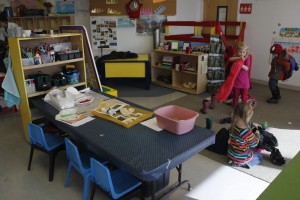
The governor’s proposed budget calls for the elimination of a $2 million pre-kindergarten program, which serves six school districts in Anchorage, Juneau, and Western Alaska.
Alaska was one of just 12 states in the U.S. without state-funded pre-kindergarten when it started a pilot program in 2009.
The pre-K program is free to qualifying low-income families and, according to Deputy Education Commissioner Les Morse, has seen considerable success in its six-year run.
“There is solid data around its success,” Morse said. “We specifically looked at various different assessments on students in terms of their’ performance as well as the delivery by districts. It’s really been very successful. The largest problem with the program is that we really haven’t been able to grow it. So it really continues to serve the same number of students and the same dollar amount that it did during its pilot phase.”
Morse says the original plan was to pilot the program, and then expand it after a few years. But according to the National Institute for Early Education Research, the program never reached more than 3 percent of four-year-olds in the state.
About 40 of those toddlers are in the Lower Kuskokwim School District, where Early Childhood Coordinator April Blevins says the pilot program is the most accessible of the early education programs offered to low-income families in the district.
“There are other programs,” Blevins said. “But they’re grant-funded programs that the parents have to apply with these huge applications, and it usually discourages people from going that route. Whereas applying for the pilot program is very simple.”
The pre-K program is also in high demand; it serves 28 children in Bethel, five in Tununak, and nine in Akiuk. Blevins has another 30 kids on a waiting list.
And besides providing education with certified teachers, Blevins says the pre-K program fills another need in communities where reliable childcare can be nearly impossible to find.
“For 6.5 hours a day, people can go to work knowing their kid is safe and receiving some education,” Blevins said. “I’ve had parents cry, because it’s the first time they’ve been able to go back to work because they’ve been watching their child, because there is no childcare. So I think sometimes there’s underlying emotions … people don’t realize how the program affects their daily life.”
In 2014, nearly five times as many 4-year-olds in the state were enrolled in Headstart programs as the pre-K program, according to NIEER.
Three-quarters of all four-year-olds were not served by Headstart or pre-K.
Governor Walker’s proposed education budget would also delete $820,000 in grants for other early childhood programs, and it would reduce funding for the Alaska Native Science and Engineering Program by $385,000.
Hannah Colton is a reporter at a in Dillingham.




